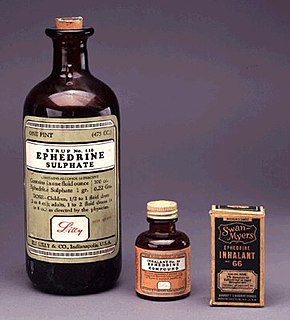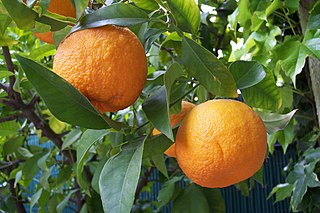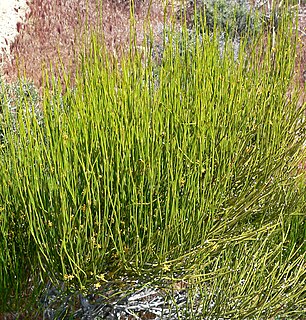
Ephedrine is a medication and stimulant. It is often used to prevent low blood pressure during spinal anesthesia. It has also been used for asthma, narcolepsy, and obesity but is not the preferred treatment. It is of unclear benefit in nasal congestion. It can be taken by mouth or by injection into a muscle, vein, or just under the skin. Onset with intravenous use is fast, while injection into a muscle can take 20 minutes, and by mouth can take an hour for effect. When given by injection it lasts about an hour and when taken by mouth it can last up to four hours.

Ephedra is a medicinal preparation from the plant Ephedra sinica. Several additional species belonging to the genus Ephedra have traditionally been used for a variety of medicinal purposes, and are a possible candidate for the soma plant of Indo-Iranian religion. It has been used in traditional Chinese medicine for more than 2,000 years. Native Americans and Mormon pioneers drank a tea brewed from other Ephedra species, called "Mormon tea" and "Indian tea".

Bitter orange, Seville orange, sour orange, bigarade orange, or marmalade orange is the citrus tree Citrus × aurantium and its fruit. It is native to Southeast Asia and has been spread by humans to many parts of the world. It is probably a cross between the pomelo, Citrus maxima, and the mandarin orange, Citrus reticulata.

D-norpseudoephedrine, also known as cathine and (+)-norpseudoephedrine, is a psychoactive drug of the phenethylamine and amphetamine chemical classes which acts as a stimulant. Along with cathinone, it is found naturally in Catha edulis (khat), and contributes to its overall effects. It has approximately 7-10% the potency of amphetamine.

Thomas Pingo (1714–1776) was an English medallist and die engraver. He worked for the Royal Mint in London. Originally thought to have come from Italy in 1742, and born there in 1692, he was in fact the son of Thomas Pingo Sr of Plumbtree Court, London. The Pingo family first appeared in London in the 1650s in the Parish of St Martins in the Fields.
The ECA stack is a drug combination used in weight loss and as a stimulant. ECA is an initialism for ephedrine, caffeine, and aspirin, with variants of it including the EC stack, which removes the aspirin for those who can not tolerate it. Dietary supplements based on or including elements of ECA were popular through the 1990s and early 2000s, but the marketing of ephedra- or ephedrine-containing stimulant combinations for weight loss and bodybuilding is now restricted or illegal in the United States, Canada and Netherlands due to reports of heart attack, stroke, and death associated with these supplements.

Pingo Doce is one of the largest supermarket operators in Portugal with almost 400 stores. It belongs to the Portuguese company Jerónimo Martins and the Dutch-based Ahold Delhaize. In the 1990s, Jerónimo Martins acquired Brazilian supermarket chain Sé Supermercados, which became the Brazilian equivalent to Pingo Doce. In the early 2000s, Companhia Brasileira de Distribuição / Grupo Pão de Açúcar, bought out Sé, rebranding its stores as Pão de Açúcar and CompreBem.

The Isle of Pingo Pongo is a 1938 Merrie Melodies cartoon supervised by Tex Avery. The short was released on May 28, 1938 and features Egghead, an early version of Elmer Fudd. This is the first of a series of travelogue spoofs, and the first Warner Bros. "spot gag" cartoon, where each vignette is punctuated by a moment of blackout.

Pingos are intrapermafrost ice-cored hills, ranging in height from 3 to 70 m and 30 to 1,000 m in diameter. They are typically conical in shape and grow and persist only in permafrost environments, such as the Arctic and subarctic. A pingo is a periglacial landform, which is defined as a non-glacial landform or process linked to colder climates. It is estimated that there are more than 11,000 pingos on Earth. The Tuktoyaktuk peninsula area has the greatest concentration of pingos in the world with a total of 1,350 pingos. There are currently remarkably limited data on pingos.

Breckland in Norfolk and Suffolk is a 39,433 hectare Special Protection Area (SPA) under the European Union Directive on the Conservation of Wild Birds. The SPA partly overlaps the 7,544 hectare Breckland Special Area of Conservation. As a landscape region it is an unusual natural habitat of England. It comprises the gorse-covered sandy heath that lies mostly in the south of the county of Norfolk but also in the north of Suffolk. An area of considerable interest for its unusual flora and fauna, it lies to the east of another unusual habitat, the Fens, and to the south west of the Broads. The typical tree of this area is the Scots pine. Breckland is one of the driest areas in England.

Ephedra is a genus of gymnosperm shrubs. The various species of Ephedra are widespread in many arid regions of the world, ranging across southwestern North America, southern Europe, northern Africa, southwest and central Asia, northern China and western South America. It is the only extant genus in its family, Ephedraceae, and order, Ephedrales and one of the three living members of the division Gnetophyta alongside Gnetum and Welwitschia.
A strobilus is a structure present on many land plant species consisting of sporangia-bearing structures densely aggregated along a stem. Strobili are often called cones, but some botanists restrict the use of the term cone to the woody seed strobili of conifers. Strobili are characterized by a central axis surrounded by spirally arranged or decussate structures that may be modified leaves or modified stems.

Ephedra sinica is a species of Ephedra native to Mongolia, Russia, and northeastern China.

Pingo Canadian Landmark, also known as Pingo National Landmark, is a natural area protecting eight pingos near Tuktoyaktuk, Northwest Territories. It is in a coastal region of the Arctic Ocean which contains approximately 1,350 Arctic ice dome hills—approximately one quarter of the world's pingos.
Metabolife International, Inc., was a multi-level marketing company based in San Diego, California which manufactured dietary supplements. Metabolife's best-selling product, an ephedra-based supplement called Metabolife 356, once generated hundreds of millions of dollars in annual sales. However, Metabolife 356 and other ephedra-containing supplements were linked to thousands of serious adverse events, including deaths, which caused the U.S. Food and Drug Administration (FDA) to ban the sale of ephedra-containing dietary supplements in 2004.

Jerónimo Martins SGPS, SA Sociedade Aberta (JM) is a Portuguese corporate group that operates in food distribution and specialised retail. It operates more than 4,400 stores in Portugal, Poland, and Colombia.

Ephedra viridis, known by the common names green Mormon tea, green ephedra, and Indian tea, is a species of Ephedra. It is indigenous to the Western United States, where it is a member of varied scrub, woodland, desert, and open habitats. It grows at 900–2,300 metres (3,000–7,500 ft) elevations.

Thompson Water, Carr and Common is a 154.7-hectare (382-acre) biological Site of Special Scientific Interest north of Thetford in Norfolk. Most of it is managed by the Norfolk Wildlife Trust as Thompson Common. It is a Nature Conservation Review site, Grade I, and part of the Norfolk Valley Fens Special Area of Conservation. It is crossed by the Great Eastern Pingo Trail Local Nature Reserve.

Ephedra gerardiana is a species of Ephedra, endemic to the mountains of Afghanistan, Bhutan, northern India, Nepal, Pakistan, Sikkim, Tajikistan, and Tibet. It is a perennial small shrub composed primarily of fibrous stalks, generally about 8 inches though sometimes growing to 24 inches in height, with small, yellow flowers followed by round, red, edible fruits. It is sometimes used as a stimulant, and in Ayurvedic medicine its tea is used as medicine for colds, coughs, bronchitis, asthma, and arthritis.
Luís Roberto Magalhães, commonly known as Pingo, is a Brazilian professional football manager and former player.

















